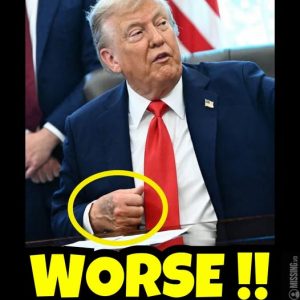
The whispers had been growing louder for weeks—clips of Donald Trump moving more slowly at campaign stops, photos showing stiffness on stage, and endless online theories about what might be wrong.
Now, the speculation has turned into confirmation. Karoline Leavitt’s statement today acknowledged what many had suspected: the former President is facing a medical condition. But with the timing, secrecy, and carefully worded reassurances, new questions are emerging about just how much is being kept from the public.
Washington, D.C. — In a development that quickly sent ripples through the political landscape, Karoline Leavitt revealed that Donald J. Trump has been diagnosed with chronic venous insufficiency—a circulatory issue that causes swelling and discomfort in the legs when blood flow becomes restricted.
While the news sparked widespread concern, Leavitt emphasized that doctors detected no heart-related complications and that Trump’s overall health remains strong. “The swelling prompted further evaluation,” she explained. “Cardiac concerns have been ruled out. The condition is manageable, and the President is receiving appropriate care.”
The announcement comes as Trump maintains an aggressive campaign pace during a tense election season. In recent weeks, footage of him moving more cautiously at rallies had fueled speculation, which today’s disclosure seeks to address.
Supporters wasted no time flooding social media with hashtags like #PrayForTrump and #TrumpStrong, offering prayers and words of encouragement. Though chronic venous insufficiency is not considered life-threatening, it requires consistent monitoring—particularly for someone constantly traveling and in the public eye.
The disclosure arrives at a crucial political moment, reminding Americans that even the most powerful figures are not exempt from the realities of age and health.
Conclusion
Trump’s health update highlights the delicate intersection of transparency and politics for a national leader. The condition may be manageable, but its revelation during a campaign ensures every detail will be scrutinized for its potential impact. For loyal supporters, it is a rallying call to stand by their candidate.
For skeptics, it raises concerns about what may still be left unsaid. Either way, the announcement underscores a sobering truth: even the most dominant figures on the world stage face human frailties—and how they confront them can shape both their legacy and the nation’s direction.